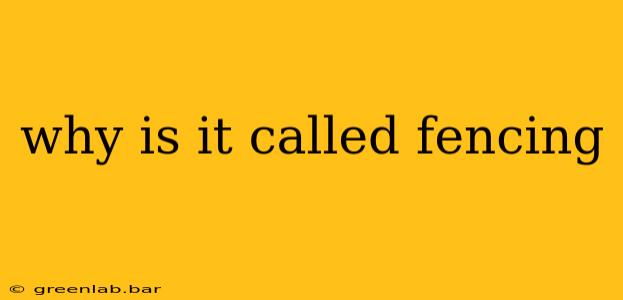The graceful, yet intensely strategic sport of fencing, with its flashing blades and lightning-fast reflexes, holds a captivating history. But why is it called fencing? The answer isn't immediately obvious, and delves into the evolution of the sport and its terminology.
From Fortification to Fighting: The Roots of the Word "Fence"
The word "fence," in its broadest sense, refers to a barrier or defense. This meaning directly relates to the origins of fencing as a combat sport. Before the refined and codified rules of modern fencing, the practice was deeply intertwined with the art of self-defense and warfare.
Medieval Origins and the Art of Defense
During the medieval period, swordsmanship was crucial for survival. The ability to effectively defend oneself with a blade was paramount, not just on the battlefield but also in daily life. The term "fence," in this context, described the defensive maneuvers and strategies employed to protect oneself from an attacker. It wasn't just about offense; it was about creating a fence of protection against incoming blows.
The Evolution of Terminology
As sword fighting evolved and became more formalized, the term "fencing" continued to be used to describe the skilled practice of swordplay. The focus shifted from purely brutal combat to a more nuanced system of techniques, footwork, and strategy. The "fence" remained, but now represented the protective barrier created by skillful swordsmanship, both literally and figuratively.
Beyond the Barrier: Fencing as a Sport
The transition from lethal combat to the controlled environment of modern sport didn't erase the historical context. The name "fencing" persists as a testament to its roots. The strategic maneuvering, the controlled aggression, and the intricate footwork all contribute to the creation of a metaphorical "fence" – a protective perimeter that the fencer constructs against their opponent.
Modern Fencing Terminology and Legacy
Even within the modern rules of fencing, the word "fence" subtly appears in descriptions of technique and strategy. For example, fencers might "fence aggressively" or "fence defensively," showcasing the ongoing connection between the action and the historical meaning of the word. This continued use of "fencing" reinforces the link between the sport's contemporary form and its combative past.
In Conclusion: A Name with History
The name "fencing" perfectly encapsulates the essence of the sport. It reflects its origins in the art of self-defense, where creating a "fence" against an attacker was paramount. It also captures the strategic and tactical aspects of modern fencing, where the fencer aims to build a defensive and offensive barrier against their opponent. The name is more than just a label; it's a historical echo resonating through centuries of swordsmanship.

